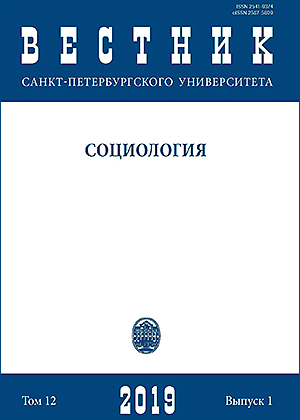Inclusive education in modern Russian schools: regional aspect
DOI:
https://doi.org/10.21638/spbu12.2019.105Abstract
The article presents the results of a sociological study conducted in secondary schools in the Sverdlovsk region at the end of 2016 — at the beginning of 2017. The opinion of children’ parents and schoolteachers of Sverdlovsk region about the current state of inclusive education, as well as the opinion of the problems dealing with its implementation in secondary schools, has been investigated in this study. The research methodology combined both quantitative and qualitative approaches. The primary data was collected using questionnaires and focus groups. One thousand children’s parents (healthy children’ and disabled children’ parents) and 1800 teachers of schools in the Sverdlovsk region were questioned on the basis of quota sampling. Focus-groups (5) were organized for the educators engaged in the system of inclusive education on a regular basis. The focus groups were conducted in order to identify key issues
of inclusive education. The study has fixed that inclusive education is a new phenomenon in the Russian education system. It began to take root in schools in the last five years. Implementation of inclusive education in the majority of the Sverdlovsk region schools is quite difficult. For the majority of them, it turns out to be more a myth than the reality. One of the major research objectives was to study the problems that prevent the development of inclusive education in Russian schools. The study has determined five main groups of problems. They are resource, system problems, organizational problems. The author concluded that the majority of teachers are in need of further training in inclusive education. This is one of the problems
of its successful realization.
Keywords:
inclusive education, secondary schools, problems of implementation, children with disabilities, teachers, parents, Sverdlovsk region
Downloads
References
References
Downloads
Published
How to Cite
Issue
Section
License
Articles of "Vestnik of Saint Petersburg University. Sociology" are open access distributed under the terms of the License Agreement with Saint Petersburg State University, which permits to the authors unrestricted distribution and self-archiving free of charge.




